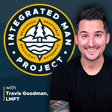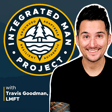
Stop Reacting, Start Responding: Presence & Nervous System Hacks for Men
This week, Travis and Pierre dive into the fourth “P” of purpose: Presence—the core skill every man needs to stop reacting and start responding with intention.
They break down what presence really means—beyond buzzwords—and share practical, research-backed tools from polyvagal theory to help men regulate their nervous systems, stay grounded, and live with clarity.
Why Presence Matters:
Presence isn’t just being “in the moment”—it’s your ability to check in, know what you feel, and respond with purpose, not impulse. It’s how you stay aligned with your values in real life—under pressure, in conflict, or when life feels heavy.
Key Takeaways:
- Presence = Nervous System Awareness
Learn how to recognize when you’re calm, triggered, or disconnected—and what to do about it. - Pause Before You React
Master the “power of the pause” to break free from anger, shame, or numbing cycles. - Emotions Are Strength
Emotional presence is courageous. Use emotions as signals—not something to hide.
Challenge:
Pause. Check in.
What state are you in?
What do you really need right now?
Notice how presence changes your response—and your life.
🎧 Listen now and join the journey at menscollective.co
JOIN THE COLLECTIVE:
JOIN THE MEN'S COLLECTIVE:
CLICK HERE
JOIN THE MAILING LIST & GET INVOLVED!
INSTAGRAM: MENSCOLLECTIVE.CO
WATCH ON YOUTUBE:
Connect and Support Travis:
YouTube: Travis Goodman
Instagram: @travis.goodman.lmft
Connect and Support Pierre:
Instagram: Braver.Man






